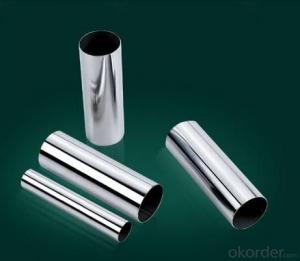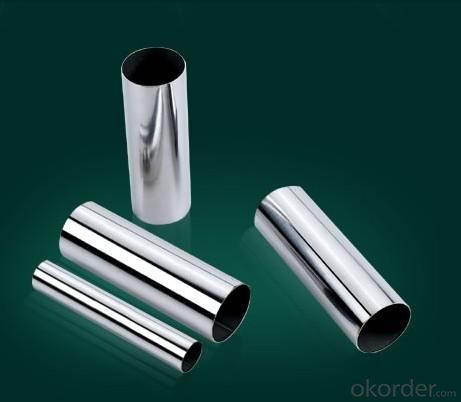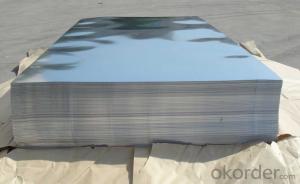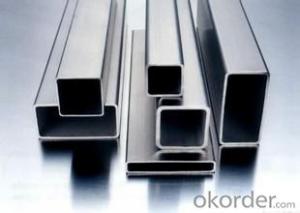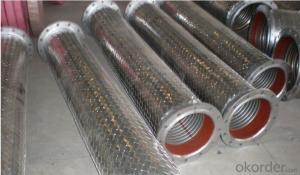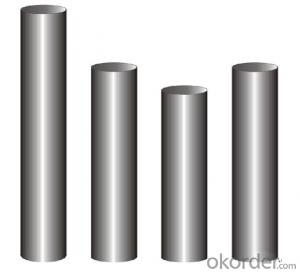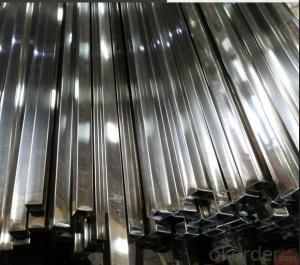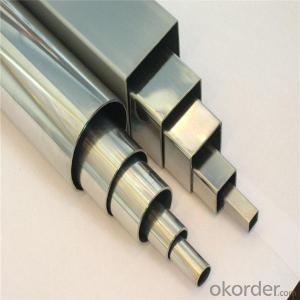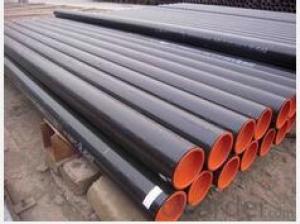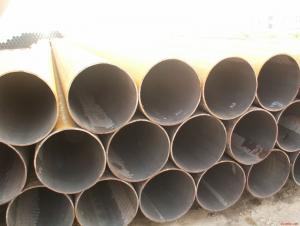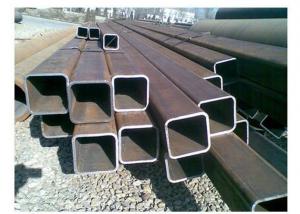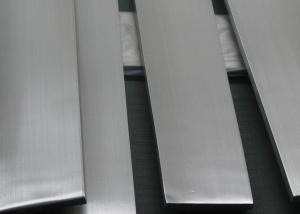Seamless Steel Pipe/Tube for Petroleum Cracking Equipment
- Loading Port:
- Shanghai
- Payment Terms:
- TT OR LC
- Min Order Qty:
- 1000 kg
- Supply Capability:
- 10000 kg/month
OKorder Service Pledge
OKorder Financial Service
You Might Also Like
Nickel200/UNS N02200/Alloy200/W.Nr.2.4066 is a pure nickel alloys. and we could supply seamless pipes/tubes
1) Specifications: OD: 10.3 - 273 mm and THK: 1 - 20 mm
2) Grades:
Nickel Alloy: Alloy 200,400,600,625,800,800H,825,etc..
Duplex/Super Duplex:S31803,S32750,S32760,S31500
Austentic/Super Austenitic:
304/L,316L/Ti,321,347H,316Lmod,317L/N,310S,310MolN,253MA,330,904L,S31254,XM-19
3) Made according to the standards of ASTM B161,163,165,167,407,444,677, etc.
4) Packing: wooden box or knit bag
ASTM A335 Seamless Alloy-Steel Pipe
Standard: BS 1139, BS 3059-2, JIS G3454-2007
Grade: 10#-45#, 15NiCuMoNb5, 10Cr9Mo1VNb
Detailed introduction to ASTM A335 seamless alloy steel pipe:
ASTM A335 seamless alloy steel pipe
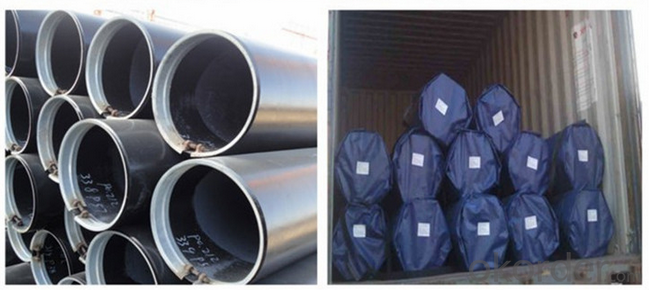
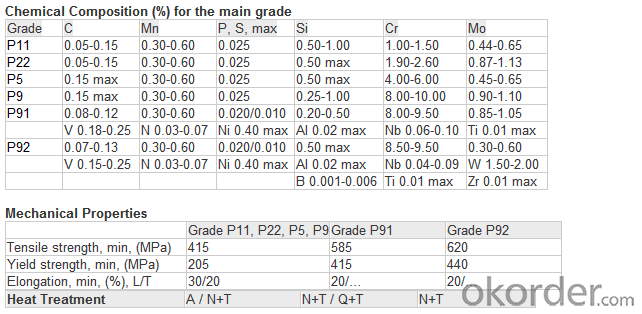
FAQ:
1) why you chose us ?
Professional Manufacturer and supplier of Steel pipe
More than 14 years’ professional producing experience
We can get the lowest ex-factory prices. The price are quite reasonable and it is lower than our commercial peers. also, we can guarantee the qualities of our products.
BV, ISO certificates and SGS test can be provided to assure the quality of our products.
2) Our minimum order quantity:
10 Metric Tons or one 20ft or 40ft Container.
3) How about the Delivery Time?
The steel pipe will be produced since we getting your deposit by T/T or Your original L/C. For normal size, some stocks in our factory now, we can supply once you need.
4)What kind of payment does your company support?
T/T, 100% L/C at sight, Cash, Western Union are all accepted.
5) Do you charge for the samples?
According to our company principle, we just charge for samples, you pay for the freight /courier charge.
6) Main market:
Mid East, South America, Africa, Southeast Asia, India etc
- Q: Can stainless steel pipes be welded?
- Indeed, it is possible to weld stainless steel pipes. Due to its remarkable resistance to corrosion and strength, stainless steel is widely favored in various industries. Among the numerous techniques employed to connect stainless steel pipes, welding is a prevalent approach. Nonetheless, it is crucial to employ suitable welding techniques and equipment to guarantee a successful weld. Each grade of stainless steel has distinct welding prerequisites, necessitating the use of a filler material that corresponds to the specific grade being welded. Furthermore, it is imperative to adequately clean and prepare the surfaces that are to be welded to ensure a robust and long-lasting joint.
- Q: What is stainless steel pipe?
- Stainless steel pipe is a type of pipe made from an alloy of steel and chromium, with a high resistance to corrosion and staining. It is commonly used in various industries, including construction, automotive, and manufacturing, due to its durability and ability to withstand harsh environments.
- Q: Can stainless steel pipes be used for solar power plants?
- Indeed, solar power plants are able to utilize stainless steel pipes. Stainless steel, being a remarkably durable and corrosion-resistant substance, proves to be fitting for outdoor and high-temperature applications like solar power plants. It retains its structural integrity and does not deteriorate even when confronted with challenging environmental conditions such as sunlight, rain, and extreme temperatures. Moreover, stainless steel pipes exhibit exceptional thermal conductivity, a crucial characteristic for effective heat transfer within solar power plants. In summary, the utilization of stainless steel pipes in solar power plants guarantees dependable and enduring performance, making it a favored option for numerous installations within the industry.
- Q: Is food grade stainless steel GB9684 304?
- 304 stainless steel is a very common stainless steel, the industry is also called 18/8 stainless steel. It is better than the corrosion resistance of 430 stainless steel, high temperature corrosion resistance, good processing performance, so it is widely used in industrial and medical furniture industry and the food industry, for example, some high-grade stainless steel tableware, bathroom and kitchen utensils. 304 is a versatile stainless steel which is widely used in the manufacture of equipment and parts requiring good overall performance (corrosion resistance and formability). In order to maintain the inherent corrosion resistance of stainless steel, steel must contain more than 17% chromium, more than 8% of the nickel content. General 304 stainless steel is not food grade, specially processed is food grade.
- Q: What are the common shapes of stainless steel pipes?
- Stainless steel pipes come in various shapes that are widely utilized across different industries. These shapes comprise of round pipes, square pipes, rectangular pipes, and oval pipes. Round pipes rank among the most prevalent shapes and find extensive use in diverse applications. They are primarily employed for fluid and gas transportation, as well as the conveyance of other materials. Furthermore, round pipes are well-suited for structural purposes like handrails, scaffolding, and support beams. Square pipes possess a square cross-section and are commonly employed in construction projects, architectural designs, and furniture manufacturing. They offer a sleek and contemporary appearance, often utilized for framing structures, manufacturing shelves, and creating decorative elements. Rectangular pipes possess a rectangular cross-section and are frequently utilized in the construction, engineering, and manufacturing industries. They are often employed in building frameworks, manufacturing gates, fences, and various structural components. Oval pipes possess an elliptical or oval shape and are used in applications where aesthetics play a significant role. They are a popular choice in architectural designs, the automotive industry, and decorative applications. In conclusion, the selection of stainless steel pipe shape depends on the specific requirements of the application and desired aesthetics. Each shape offers distinct advantages and is chosen based on factors such as strength, durability, ease of fabrication, and overall design requirements.
- Q: Can stainless steel pipes be used for brewery equipment?
- Yes, stainless steel pipes can be used for brewery equipment. Stainless steel is an ideal choice for brewery equipment due to its corrosion resistance, durability, and ability to maintain the integrity of the beer. Stainless steel pipes do not react with the beer or any cleaning and sanitizing agents used in the brewing process, ensuring the purity and taste of the final product. Additionally, stainless steel pipes are easy to clean and maintain, reducing the risk of contamination and allowing for efficient operations in the brewery.
- Q: Are stainless steel pipes suitable for heat exchangers?
- Yes, stainless steel pipes are suitable for heat exchangers. Stainless steel is known for its excellent heat resistance properties, making it an ideal choice for applications involving high temperatures. It can withstand extreme heat without deforming or losing its structural integrity. Additionally, stainless steel is highly corrosion-resistant, which is crucial for heat exchangers as they are often exposed to corrosive fluids or environments. The corrosion resistance ensures the longevity and reliability of the heat exchanger, reducing the risk of leaks or failures. Stainless steel pipes also offer excellent thermal conductivity, allowing for efficient heat transfer between the fluids in the exchanger. Overall, stainless steel pipes are widely used in heat exchangers due to their durability, corrosion resistance, and ability to withstand high temperatures.
- Q: What are the common applications of stainless steel pipes in the construction industry?
- Stainless steel pipes are commonly used in the construction industry for various applications such as water and gas supply systems, heating and ventilation systems, structural supports, and exterior cladding. They are preferred for their corrosion resistance, durability, and strength, making them suitable for both indoor and outdoor construction projects.
- Q: Can stainless steel pipes be used for high-pressure applications?
- Yes, stainless steel pipes can be used for high-pressure applications. Stainless steel is known for its excellent strength and corrosion resistance, making it suitable for handling high-pressure environments. It can withstand the high pressure without deformation or leakage, ensuring the safety and reliability of the system.
- Q: Can stainless steel pipes be used for nuclear power plants?
- Yes, stainless steel pipes can be used for nuclear power plants. Stainless steel is a commonly used material in the construction of nuclear power plants due to its excellent corrosion resistance and high-temperature strength. These properties are essential for withstanding harsh operating conditions, such as high temperatures and corrosive environments, that are typically present in nuclear power plants. Additionally, stainless steel is known for its durability and long service life, making it a reliable choice for critical applications in the nuclear industry.
Send your message to us
Seamless Steel Pipe/Tube for Petroleum Cracking Equipment
- Loading Port:
- Shanghai
- Payment Terms:
- TT OR LC
- Min Order Qty:
- 1000 kg
- Supply Capability:
- 10000 kg/month
OKorder Service Pledge
OKorder Financial Service
Similar products
Hot products
Hot Searches
Related keywords
